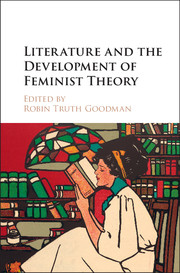Book contents
- Literature and the Development of Feminist Theory
- Literature and the Development of Feminist Theory
- Copyright page
- Contents
- Notes on Contributors
- Book part
- Chapter 1 Introduction
- Chapter 2 “Original Spirit”: Literary Translations and Translational Literature in the Works of Mary Wollstonecraft
- Chapter 3 Jane Eyre,Incidents in the Life of a Slave Girl, and the Varieties of Nineteenth-century Feminism
- Chapter 4 Progressive Portraits: Literature in Feminisms of Charlotte Perkins Gilman and Olive Schreiner
- Chapter 5 Feminist Poetics: First-Wave Feminism, Theory, and Modernist Women Poets
- Chapter 6 Woolf and Women’s Work: Literary Invention in an Obscure Hat Factory
- Chapter 7 Walking in a Man’s World: Myth, Literature, and the Interpretation of Simone de Beauvoir’sThe Second Sex
- Chapter 8 Decapitation Impossible: The Hundred Heads of Julia Kristeva
- Chapter 9 Shattering the Gender Walls: Monique Wittig’s Contribution to Literature
- Chapter 10 Hélène Cixous: Writing for Her Life
- Chapter 11 Subversive Creatures from behind the Iron Curtain: Irmtraud Morgner’sThe Life and Adventures of Trobadora Beatrice as Chronicled by Her Minstrel Laura
- Chapter 12 Christa Wolf: Literature as an Aesthetics of Resistance
- Chapter 13 Naked Came the Female Extraterrestrial Stranger: Applying Linda M. Scott’sFresh Lipstickto Sue Lange’sThe Textile Planet
- Chapter 14 Captive Maternal Love: Octavia Butler and Sci-Fi Family Values
- Chapter 15 More than Theater: Cherríe Moraga’sThe Hungry Womanand the Feminist Phenomenology of Excess
- Chapter 16 Nawal el Saadawi: Writer and Revolutionary
- Chapter 17 “The Woman Who Said ‘No’”: Colonialism, Islam, and Feminist Resistance in the Works of Assia Djebar1
- Notes
- Index
- References
Chapter 15 - More than Theater: Cherríe Moraga’sThe Hungry Womanand the Feminist Phenomenology of Excess
Published online by Cambridge University Press: 05 December 2015
- Literature and the Development of Feminist Theory
- Literature and the Development of Feminist Theory
- Copyright page
- Contents
- Notes on Contributors
- Book part
- Chapter 1 Introduction
- Chapter 2 “Original Spirit”: Literary Translations and Translational Literature in the Works of Mary Wollstonecraft
- Chapter 3 Jane Eyre,Incidents in the Life of a Slave Girl, and the Varieties of Nineteenth-century Feminism
- Chapter 4 Progressive Portraits: Literature in Feminisms of Charlotte Perkins Gilman and Olive Schreiner
- Chapter 5 Feminist Poetics: First-Wave Feminism, Theory, and Modernist Women Poets
- Chapter 6 Woolf and Women’s Work: Literary Invention in an Obscure Hat Factory
- Chapter 7 Walking in a Man’s World: Myth, Literature, and the Interpretation of Simone de Beauvoir’sThe Second Sex
- Chapter 8 Decapitation Impossible: The Hundred Heads of Julia Kristeva
- Chapter 9 Shattering the Gender Walls: Monique Wittig’s Contribution to Literature
- Chapter 10 Hélène Cixous: Writing for Her Life
- Chapter 11 Subversive Creatures from behind the Iron Curtain: Irmtraud Morgner’sThe Life and Adventures of Trobadora Beatrice as Chronicled by Her Minstrel Laura
- Chapter 12 Christa Wolf: Literature as an Aesthetics of Resistance
- Chapter 13 Naked Came the Female Extraterrestrial Stranger: Applying Linda M. Scott’sFresh Lipstickto Sue Lange’sThe Textile Planet
- Chapter 14 Captive Maternal Love: Octavia Butler and Sci-Fi Family Values
- Chapter 15 More than Theater: Cherríe Moraga’sThe Hungry Womanand the Feminist Phenomenology of Excess
- Chapter 16 Nawal el Saadawi: Writer and Revolutionary
- Chapter 17 “The Woman Who Said ‘No’”: Colonialism, Islam, and Feminist Resistance in the Works of Assia Djebar1
- Notes
- Index
- References
- Type
- Chapter
- Information
- Literature and the Development of Feminist Theory , pp. 200 - 213Publisher: Cambridge University PressPrint publication year: 2015



